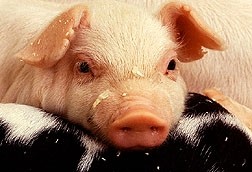Study finds bacterial contamination in majority of US pork products tested
The magazine tested pork chop and ground pork products form six US cities, and found the bacterium in 69% of the 198 samples tested.The majority of the yersinia and as well as a substantial portion of several other bacteria detected were resistant to medically important antibiotics.
"Antibiotics are routinely fed to healthy animals at low levels. This practice promotes the development of antibiotic resistant bacteria which are a major public health concern," said Dr. Urvashi Rangan, Director of Safety and Sustainability at Consumer Reports. "Infections caused by resistant bacteria are more difficult to treat and can lead to increased suffering and costs."
Traces of growth drug found
In addition to the bacterial contamination, a separate test for ractopamine, a drug given to pigs to promote grown and leanness, found low but detectable levels in about a fifth of 240 samples. The levels were below acceptable limits, but the drug is banned outright in China, Taiwan and the European Union over safety concerns.
"No drugs, including ractopamine and antibiotics, should be fed routinely to healthy animals for growth promotion and to prevent disease. These practices are harmful to public health, which is why they are banned in Europe," said Dr. Michael Hansen senior scientist for Consumer Reports.
The study found that ground pork products were more likelty to be contaminated than whole meat products. It also found that salmonella, staphylococcus aureus, or listeria monocytogenes, more well-known causes of foodborne illness, were found in 3 to 7 percent of samples. And 11 percent harbored enterococcus, which can indicate fecal contamination.
Safety concerns disputed
James H. Hodges, executive vice president of the American Meat Institute, disputed the notion that the report indicated widespread problems in the US pork supply.
“The most critical takeaway for U.S. pork consumers is this: US pork remains among the safest in the world,” he told FoodNavigator-USA.
“US pork processors use many food safety technologies to ensure pork safety. While our goal is to destroy all bacteria during processing, nature dictates that all raw agricultural products–including pork–can contain bacteria. Centers for Disease Control and Prevention data indicate that overall, infections with Yersinia enterocolitica from all foods have been slashed by a third since 1999,” he said.
Consumer’s Union, the publisher of Consumer Reports, has launched a Meat Without Drugs campaign and is calling on grocers to sell only drug-free meat. It launched its campaign recently by asking the Trader Joe’s chain to stop selling meat raised with antiboitics and other drugs such as ractopamine.
The group has also called on FDA to ban the prophylactic use of antibiotics and confine their use only to sick animals diagnosed by a veterinarian. Antiobotics are commonly given to all animals in large containment facilities that can house as many as 2,000 pigs. The crowded conditions mean bacterial infections can spread more easily.













